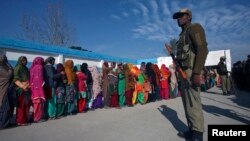In India, Prime Minister Narendra Modi’s Hindu nationalist Bharatiya Janata Party has made impressive gains in local elections held in the disputed Muslim majority Kashmir region, although it failed to win a majority. The party also has wrested power in another state, expanding its footprint in the country.
The Bharatiya Janata Party has won 25 of 87 seats in the Jammu and Kashmir assembly, just a handful of seats behind the regional People’s Democratic Party, which won the most seats. No party in the state secured a clear majority.
Although the BJP’s bid to take control of the government in the Muslim majority region failed, its strong showing means the Hindu nationalist party will be a dominant force in Kashmir’s politics.
Kashmir is claimed by both India and Pakistan. The BJP had hoped that a victory will help them integrate the region, where anti-India sentiment runs high, more closely with the rest of the country.
Modi's muscle
BJP head Amit Shah said the election results show voters endorse Prime Minister Modi’s style of governance. He pointed out the party has more than doubled its share of seats in the state.
Shah said all options are open to the party, whether to form the government, support another party or join a coalition.
Political analyst Satish Misra at New Delhi’s Observer Research Foundation says the possibility of BJP being part of the Kashmir government along with the People’s Democratic Party cannot be ruled out.
“Ideally, it would be much better if the two parties dropped their ideological divisions and formed a government together. Because BJP being in power in the center, then the development of Jammu and Kashmir will be smooth and the governance will be frictionless,” said Misra.
Strong turnout
Kashmiris, weary of years of strife, voted in large numbers, hoping to get a government that will focus on development.
But BJP picked up most of its support from the Hindu dominant Jammu region. It fared poorly in the Kashmir valley, the hub of a two-decade separatist campaign, and where the party is eyed with deep suspicion due to its Hindu nationalist leanings. The party failed to make a dent in Buddhist Ladakh also.
There was some good news for the party in the east of the country. It also won power in Jharkhand state, the third state it has won since May, when it won control of the federal government.
But Misra sounds a note of caution. "The BJP has gained a lot in 2014, after having won the national elections. But they have to perform well according to people’s expectations, the promises that they have made. And the kind of issues that are being raked up at the moment, I think people would start thinking about the BJP. 2015 is going to be very crucial for the BJP.”
The BJP is currently under fire from opposition parties for not reining in hardline affiliate groups that are allegedly luring Christians and Muslims to convert to Hinduism.




